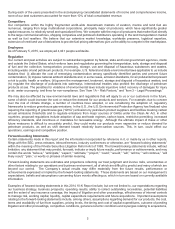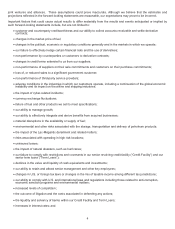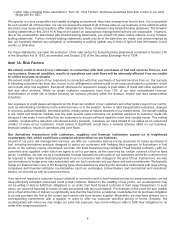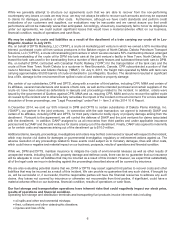World Fuel Services 2014 Annual Report Download - page 18
Download and view the complete annual report
Please find page 18 of the 2014 World Fuel Services annual report below. You can navigate through the pages in the report by either clicking on the pages listed below, or by using the keyword search tool below to find specific information within the annual report.13
to obtain working capital advances and letters of credit, any of which could have a material adverse effect on our business,
financial condition, results of operations and cash flows.
Our operations may be adversely affected by legislation as well as competition from other energy sources and new
or advanced technology.
Fuel competes with other sources of energy, some of which are less costly on an equivalent energy basis. There are
significant governmental incentives and consumer pressures to increase the use of alternative fuels in the United States
and abroad. A number of automotive, industrial and power generation manufacturers are developing more fuel efficient
engines, hybrid engines and alternative clean power systems using fuel cells or clean burning gaseous fuels. The more
successful these alternatives become as a result of governmental incentives or regulations, technological advances,
consumer demand, improved pricing or otherwise, the greater the potential negative impact on pricing and demand for our
products and services and accordingly, our profitability.
In addition, federal, state, local and/or foreign governments may enact legislation or regulations that attempt to control or
limit GHGs such as carbon dioxide. Such laws or regulations could impose costs tied to carbon emissions, operational
requirements or restrictions, or additional charges to fund energy efficiency activities. They could also provide a cost
advantage to alternative energy sources, result in other costs or requirements, such as costs associated with the adoption
of new infrastructure and technology to respond to new mandates, or impose costs or restrictions on end users of fuel. For
example, some of our customers in the transportation industry may be required to purchase allowances or offsets or incur
other costs to comply with existing or future requirements relating to GHG. Finally, the focus on climate change could also
negatively impact the reputation of fuel products or services such as those we offer. The occurrence of any of the foregoing
events could put upward pressure on the cost of fuel relative to other energy sources, increase our costs and the prices we
charge our customers, reduce the demand for our products, and therefore adversely affect our business, financial condition,
results of operations and cash flows.
Material disruptions in the availability or supply of fuel would adversely affect our business.
The success of a significant portion of our business depends on our ability to purchase, sell and coordinate delivery of fuel
and fuel related services to our customers. Our business would be adversely affected to the extent that political instability,
natural disasters, terrorist activity, military action or other conditions disrupt the availability or supply of fuel. In addition, we
rely on a single or limited number of suppliers for the provision of fuel and related products and services in certain markets.
These parties may have significant negotiating leverage over us, and if they are unable or unwilling to supply us on
commercially reasonable terms, our business would be adversely affected.
Current and future litigation could have a material adverse effect on our business and results of operations.
We are currently involved in legal proceedings that have arisen in the ordinary course of our business. Lawsuits and other
administrative or legal proceedings can involve substantial costs, including the costs associated with investigation, litigation
and possible settlement, judgment, penalty or fine. Although we generally maintain insurance to mitigate certain costs, there
can be no assurance that costs associated with lawsuits or other legal proceedings will not exceed the limits of insurance
policies. Our business, financial condition, results of operations and cash flows could be adversely affected if a judgment,
penalty or fine is not fully covered by insurance.
Changes in U.S. or foreign tax laws could adversely affect our business and future operating results.
We are affected by various U.S. and foreign taxes, including income taxes and taxes imposed on the purchase and sale of
aviation, marine and land fuel products, such as sales, excise, value added tax, energy, environmental and other taxes.
From time to time, we may also benefit from special tax concessions in certain jurisdictions. Changes in U.S. and foreign
tax laws, our failure to comply with such laws or the loss of tax concessions could adversely affect our business, financial
condition, results of operations and cash flows.
Furthermore, significant judgment is required in determining our worldwide provision for income taxes. In the ordinary course
of our business, there are many transactions and calculations where the ultimate tax determination is uncertain. We are
regularly under audit by tax authorities and, although we believe our tax estimates are reasonable, the final determination
of tax audits and any related litigation could be materially different from our historical income tax provisions and accruals.
The results of an audit or litigation could have a material effect on our financial statements in the period or periods for which
that determination is made.
Finally, we earn a significant amount of our operating income from outside the U.S., and any repatriation of funds currently
held in foreign jurisdictions to the U.S. may result in higher effective income tax rates for the Company. In addition, there have
been proposals to change U.S. income tax laws that would significantly impact how U.S. multinational corporations are taxed
























